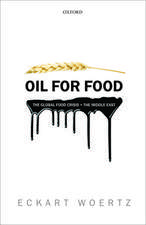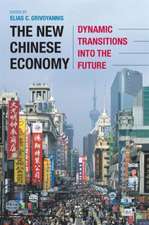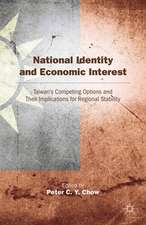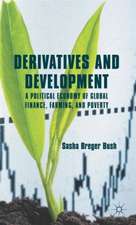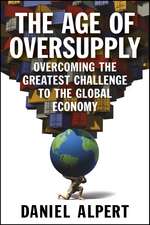The New Brazilian Economy: Dynamic Transitions into the Future
Editat de Elias C. Grivoyannisen Limba Engleză Hardback – 13 dec 2016
| Toate formatele și edițiile | Preț | Express |
|---|---|---|
| Paperback (1) | 781.94 lei 6-8 săpt. | |
| Palgrave Macmillan US – 11 dec 2018 | 781.94 lei 6-8 săpt. | |
| Hardback (1) | 786.36 lei 6-8 săpt. | |
| Palgrave Macmillan US – 13 dec 2016 | 786.36 lei 6-8 săpt. |
Preț: 786.36 lei
Preț vechi: 958.98 lei
-18% Nou
Puncte Express: 1180
Preț estimativ în valută:
150.48€ • 160.90$ • 125.46£
150.48€ • 160.90$ • 125.46£
Carte tipărită la comandă
Livrare economică 17 aprilie-01 mai
Preluare comenzi: 021 569.72.76
Specificații
ISBN-13: 9781137462961
ISBN-10: 1137462965
Pagini: 272
Ilustrații: XXXVI, 331 p. 138 illus.
Dimensiuni: 148 x 210 x 25 mm
Greutate: 0.57 kg
Ediția:1st ed. 2017
Editura: Palgrave Macmillan US
Colecția Palgrave Macmillan
Locul publicării:New York, United States
ISBN-10: 1137462965
Pagini: 272
Ilustrații: XXXVI, 331 p. 138 illus.
Dimensiuni: 148 x 210 x 25 mm
Greutate: 0.57 kg
Ediția:1st ed. 2017
Editura: Palgrave Macmillan US
Colecția Palgrave Macmillan
Locul publicării:New York, United States
Descriere
Brazil is the most populous economy in Latin America today with the second highest GDP among the emerging BRIC economies, after China , and the second per capita GDP among the BRIC economies after Russia . The objective of the proposed book is to provide a thorough historical, statistical, and institutional description of the Brazilian economy along with a most recent account of what is presently going on in Brazil and the type of economy from which Brazil is emerging. The topics addressed in this book will increase the reader's awareness of the institutional economic and cultural forces that shape the dynamism of the Brazilian economy today and will continue to do so for the years to come.Some of the questions that this book will address are: How did the Brazilian economy evolve into what it is today? How does the Brazilian economy affect the developing and industrialized countries and why should the present state of the Brazilian economy be of any interest or concern to the rest of the world? How is the Brazilian banking sector evolving and what role do private banks and finance play in this change? How do the demographic changes in Brazil interact with capital accumulation and influence sustainable socio-economic growth? What accounts for consumption inequalities among Brazil's population? What processes are responsible for the current distribution of income in Brazil? How is the recent economic crisis of industrialized countries expected to affect Brazil's economic stability and long term growth? How are the policy makers in Brazil dealing with international and domestic economic challenges? Those who study multinational enterprises and the future of their direct investment in Brazil will learn about the existing types of government intervention which will continue to play an important role in the future economic growth of the country. They will also gain some understanding of Brazilian antitrust policy and the international implications of Brazil's transition into an emerging world economic power.
Cuprins
1. A Historical Background of the Brazilian Economy; Elias C. Grivoyannis
2. The Brazilian Economy at the End of the Twentieth Century; Daví José Nardy Antunes
3. Manufacturing Industry and Growth: An Interpretation for the Performance of the Brazilian Economy in the 1990s and 2000s; Carmem Feijo, Marcos Tostes Lamonica
4. Deindustrialization in Brazil?; Germano Mendes de Paula
5. Thriving Through Uncertainty: Fiscal Space for Brazilian Sustainable Growth; Viviane Luporini, Margarida Gutierrez
6. Some Lessons from the Household Consumption Boom in Brazil, 2003-2013; Eduardo F. Bastian, Fabio de Silos Sá-Earp
7. Funding, State, and Debt Crisis; Daví José Nardy Antunes
8. Long-Term Financing in Brazil: The Role of the Brazilian Development Bank; Luiz Pinto, Marcos Jorge Teixeira Reis
9. Evolution of Financial Markets in Post-Stabilization Brazil: Trends and Traits; André Roncaglia de Carvalho, Joelson Oliveira Sampaio, Fabio Gallo Garcia
10. Brazil’s Macroprudential Framework to Tackle the Great Financial Crisis: Monetary Policy, Financial Regulation, and the Banking System; André de Melo Modenesi, Marcos Reis, Rui Lyrio Modenesi, Tarciso Gouveia da Silva
11. Antitrust Policy in Brazil: Evolution and Perspectives; Germano Mendes de Paula, and Enrico Spini Romanielo
12. The New Petroleum Policy in Brazil; Luiz Pinto
13. Productive Structure in the NeoKaleckian Model of Growth and Distribution: Simulations to the Brazilian Economy; Danilo Spinola
14. The Effects of Public Debt Management on Macroeconomic Equilibrium: An Analysis of the Brazilian Economy; Fabio Henrique Bittes Terra, Cleomar Gomes da Silva, Manoel Carlos de Castro Pires
Notă biografică
Elias C. Grivoyannis is Associate Professor of Economics at Yeshiva University, USA. He has also taught at New York University, Columbia University Barnard College, and the City University of New York. He is the author of Current Issues of Monetary Policy in the United States and Japan, coauthor of Health Care Systems in Japan and the United States, and editor of The New Chinese Economy.
Contributors
Daví José Nardy Antunes, University of Campinas, Brazil
Eduardo F. Bastian, Federal University of Rio de Janeiro, Brazil
Cleomar Gomes da Silva, Federal University of Uberlândia, Brazil
Tarciso Gouveia da Silva, PETROS-Fundação Petrobras de Seguridade Social, Brazil
André Roncaglia de Carvalho, University of São Paulo, Brazil
Germano Mendes de Paula, Federal University of Uberlandia, Brazil
Carmem Feijo, Fluminense Federal University, Brazil
Fabio Gallo Garcia, Pontifical Catholic University of São Paulo, Brazil
Margarida Gutierrez, Federal University of Rio de Janeiro, Brazil
Marcos Tostes Lamonica, Fluminense Federal University, Brazil
Viviane Luporini, Federal University of Rio de Janeiro, Brazil
André de Melo Modenesi, Federal University of Rio de Janeiro, Brazil
Rui Lyrio Modenesi, Fluminense Federal University, Brazil
Luiz Pinto, Federal University of Rio de Janeiro, Brazil
Manoel Carlos de Castro Pires, Institute of Applied Economic Research, Brazil
Marcos Jorge Teixeira Reis, National Institute of Higher Studies, Equador
Enrico Spini Romanielo, Mundie e Advogados, Brazil
Fabio de Silos Sá-Earp, Federal University of Rio de Janeiro, Brazil
Joelson Oliveira Sampaio, Pontifical Catholic University of São Paulo, Brazil
Danilo Spinola, University of Campinas, Brazil
Fabio Henrique Bittes Terra, Federal University of Uberlândia, Brazil
Textul de pe ultima copertă
This edited collection provides a thorough historical, statistical, and institutional description of the current Brazilian economy and the previous economic structure from which it is emerging. The contributions explore the institutional economic and cultural forces shaping the current development of the Brazilian economy and discuss how they will influence future progress. Together, the chapters form a picture of the international implications of Brazil’s emergence as a major world economic power. Topics covered include the growth and shrinkage of industry, the consumption boom and the financial crisis, sustainable financial growth and public debt management, the evolution of antitrust policy and the privatization of state-owned firms, and more. Academics and researchers of BRICS countries and Latin American and Caribbean studies will find these contributions a valuable addition to their research.
Caracteristici
Provides a comprehensive introduction to the modern Brazilian economy
Delivers insights from academics actually located in Brazil
Measures the impact of the financial crisis
Delivers insights from academics actually located in Brazil
Measures the impact of the financial crisis


